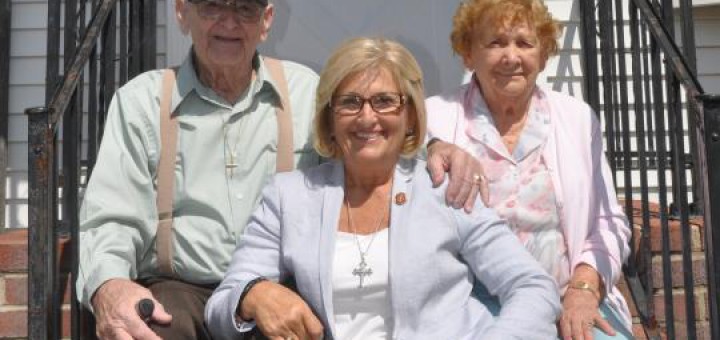Her parents fell in love on the assembly line of a paper box factory in a run-down part of Baltimore.
Both had dropped out of school — he after sixth grade, she after ninth — to help their families make ends meet.
U.S. Rep. Diane Black, R-Gallatin, spent her first years in public housing in Baltimore. But the little girl dreamed big. At 4, she asked her parents for a doctor’s kit for her birthday.
When she was 5, her family moved to a poor area of a tiny rural Maryland town, Ferndale, where the 1,000-square-foot house literally was on the other side of the railroad tracks from rich folks.
She spent several years sleeping in the same bed with her two older brothers, her younger sister in a crib next to the bed. “Most of the time, I slept in the middle,” she says.
Her parents, Joseph and Audrie Warren, provided a safe, loving home. Black played with friends, got tortured by her brothers and kept dreaming of being a nurse.
But her parents couldn’t support those dreams.
“You can’t go to college,” Black’s mother told her often. “We don’t have the money for that. How are you going to go to college?”
The answer? Black’s high school guidance counselor, Mr. Whiting, who believed in Black, pushed her to do well and eventually found a scholarship for his favorite student.
“I had a really special relationship …,” Black starts, and her voice catches. She sits in silence for a full minute, tears rolling down her face.
“He saw something in me I didn’t see in myself. He never let me forget it.”
A guinea pig for her brothers
Black may have grown up poor, but she had fun. She and her brothers rolled in a mischievous pack, regularly getting in trouble with their parents.
Black often was the guinea pig, or the victim: “They teased the living hell out of me.”
There was the time they decided to put up a tire swing, and Black was the first to try it out. Her brothers twisted the rope over and over, and Black flew around so fast so many times that she got sick. The brothers had to carry her home.
Then there was the time her brothers decided to have a fire drill where they would have to escape out a second-floor window. Again, Black went first, and her brothers gave her a shove. That ended with the girl in the hospital getting stitches in her tongue.
“My mother would say, ‘Why do you play with them?’ I was too dumb not to go back for more because I had such a good time.”
Dad eventually built out the attic in the house, and at age 10, Black had her own room, with a white canopy bed with a light yellow trim on the drawers.
A few years later, Black learned how to sew in a home economics class, and she and her mom started making all of the girl’s outfits.
Black really had no idea her family was poor until she went to high school and she and her friends first mixed with kids from the affluent side of town. There, the older kids had their own cars, and nice ones, too.
The rich kids even had credit cards paid by their parents, and Black made new friends, friends who went on shopping sprees.
“I’d go to department stores with them and think, ‘One day, I’m going to go in and buy me clothes that I haven’t made,’ ” she says.
In ninth grade, she met her guidance counselor, Richard Whiting, the only school staff member to wear a suit and tie every day to school. She first was impressed that Whiting gave up every Saturday night to run a teen center at the school to give neighborhood youths a safe place to hang.
Black started to volunteer for the teen center, in part because Whiting would take volunteers out for burgers when the center closed about 9:30 or 10 p.m. And that’s when she and her guidance counselor started to get to know each other better.
By 10th grade, Whiting started asking her the same question, again and again: “You are going to go to college, right?”
Black protested, said her parents didn’t have the money.
“Well, you’ll need a scholarship then.”
But, she said, her parents would just be thrilled if she finished high school.
“You’re going to nursing school,” he’d say.
And she started to believe him — especially when Whiting started to submit her name for scholarships with local civic groups.
One day, senior year, the office announced that she needed to go to Mr. Whiting’s office. Black wondered if her counselor wanted to talk about the teen center or maybe chide her about one of her grades.
Whiting instead told her the local Optimist Club had named her “Girl of the Year.” That title came with a check for more than $1,000 — enough to send her to the first year of nursing school.
“I think I jumped up and down and screamed like a silly girl,” she said.
Whiting beamed.
The two stayed in touch after Black graduated and went to community college, paying for the second year herself. Whiting went to graduation to see her get an associate’s degree.
Black got married and followed her husband to Nashville, getting her nursing degree from Belmont.
Whiting was the godfather of Black’s oldest daughter, Jill, now 40.
Just a few years later, Whiting died.
Black often wonders what would’ve happened had Whiting not taken such an interest in her.
“If it weren’t for him, I don’t think I’d be where I am today,” she said.
“I know he’s in heaven, and I know he looks down and sees me. And I know I make him smile.”
Black worked as a nurse through the late 1990s, when she first ran for and won a seat in the state legislature. After 10 years, Black ran for Congress and won. She has kept her nursing license current throughout.
Black says in Congress she reflects on what Whiting taught her — “that everyone has God-given potential and that where you start in life does not determine where you end up.”
“Government should help, not hinder, as individuals seek to pursue their American dream,” she said. “Because of Mr. Whiting’s investment in my life, that is the lens with which I view each issue in Congress.”
Reach Brad Schmitt at 615-259-8384 and on Twitter @bradschmitt.
U.S. Rep. Diane Black at a glance
Represents: Tennessee’s 6th Congressional District, made up of parts of Sumner, Wilson, Cumberland and 16 other counties
Party: Republican
In office since: 2011
Buzz: CQ Roll Call this year named Black to its list of 25 Most Influential Women in Congress.
Read or Share this story: http://tnne.ws/1UK9Tve
Source: Tennessean
Diane Black was lovingly pushed out of poverty














Recent Comments